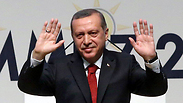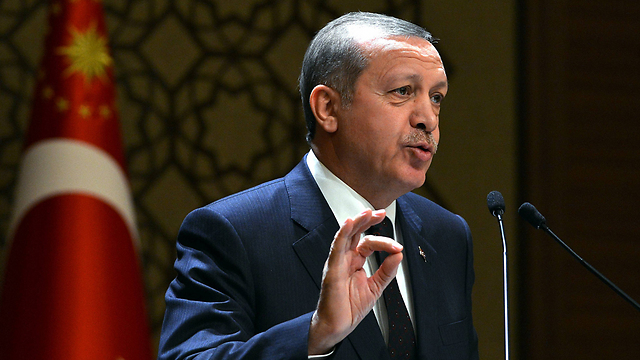
Turkish film 'Mastermind' purports to reveal Jewish conspiracy
Anti-Semitic documentary, based in part on Erdogan speech, claims Jews have conspired to dominate the world for 3,500 years; Turkish ruling party said to be encouraging such conspiracy theories.
A documentary recently aired on pro-government Turkish news channel A Haber has sparked a new debate about anti-Semitism in Turkey, home to approximately 17,000 Jews.
The film, called Üst Akıl (Mastermind) and also published on major pro-government newspaper websites such as Sabah, claims that Jewish people have conspired to dominate the world for 3,500 years.
Several academics, journalists, and Etyen Mahçupyan, former adviser to Prime Minister Ahmet Davutoğlu, appear in the film, which is based in part on a speech given by President Recep Tayyip Erdoğan last December.
Mastermind opens with the speech, in which Erdoğan describes "operations" against Turkey. "Behind all these there is a mastermind,” he explains, before telling his audience “you know who it is."
The narrator then says this mastermind, who "rules, burns, destroys, starves the world, creates wars, organizes revolutions and coups, establishes states within states, (and is) the curse of the entire world," can be found "in Jerusalem, where the sons of Israel live," before delving into a conspiratorial tirade of historical manipulation.
"This is pretty much the worldview in the AKP now," says writer and political commentator Mustafa Akyol, referring to Turkey’s ruling Justice and Development Party.
"The message they’re pumping into society is (that there is) a global Jewish conspiracy against the AKP."
Akyol explains that anti-Semitism and conspiracy theories in Turkey far predate the AKP, but the party has ushered in an atmosphere wherein these beliefs flourish.
"Unfortunately, conspiracy theory is a national problem," he says. "But the AKP is now shamelessly aggressive with them, and this so-called documentary is the zenith."
The AKP started off as a reformist, Islamic-inspired political party in 2001, distancing itself from the conspiracy theories of some of Turkey’s fully Islamist parties.
However, according to Akyol, the party became increasingly paranoid, anti-Semitic and conspiratorial following challenges to its rule such as the widespread Gezi Park protests in spring 2013 and investigation of high-level government corruption in December of that year. The Gezi Park protests, in which 8 people died and around 8,000 were arrested, began as an environmental protest against government plans to urbanize the park but flared into wider dissent, due to heavy handed tactics by riot police and wide spread resentment of the Erdoğan government.
"They decided to interpret these not just as Turkish affairs but a global plot to topple them," he says.
In one often-ridiculed instance during the protests, Erdoğan’s top economic advisor Yığıt Bulut even alleged that foreign forces were trying to assassinate the then prime minister using telekinesis.
Akyol says the military coup ousting then Egyptian president and Muslim Brotherhood member Mohamed Morsi in July 2013 also scared the pro-Brotherhood AKP.
"In their mind, the coup in Egypt was manufactured by America and Israel to get rid of Ikhwan (the Muslim Brotherhood), and the same thing would have happened in Turkey," had Erdoğan not prevented it, according to Akyol.
Furthermore, opposition to Israeli policy often transforms into anti-Jewish sentiment.
"Israel isn’t just seen as a nation-state which is heavy-handed in its counter-insurgency," Akyol says. "It’s seen as 'the Jews.' From anger against Israel you jump into a general dislike of the Jews."
According to the Pew polling agency, 86 percent of Turks see Israel unfavorably.
Dr. Louis Fishman, an American-Israeli specialist in Turkish affairs, worries the anti-Semitism in Turkey is no longer "isolated to the back shelves of bookstores," but is shifting into the official mainstream.
"The fact that there are anti-Semites or anti-Semitic propaganda in Turkey isn’t the main point. You have anti-Semitism everywhere in the world," Fishman told The Media Line. "The problem is they’re on state-propagated TV."
"It’s not just that the state is ignoring it," he says. "The state is inherently part of it."
Deputy Prime Minister Bülent Arınç’s said earlier this month that “no one in Turkey is anti-Semitic," and condemned other countries for "lagging behind Turkey," in tolerance. However, even high-level AKP officials have publicly made anti-Semitic comments.
During Israel’s Operation Protective Edge in the Gaza Strip last summer, widely condemned in Turkey, AKP deputy Samil Tayyar tweeted, "May your race vanish and may you always have your Hitler."
Ankara mayor and prominent AKP member Melih Gökçek supported pop star Yıldız Tilbe during the conflict in Gaza after she tweeted, "May Allah bless Hitler."
Former Deputy Prime Minister Beşir Atalay accused "international Jewry" of being behind the Gezi protests because they are "jealous of Turkey’s growth."
Though Ataly later retracted his statements, none of the other officials apologized nor were condemned for their anti-Semitic remarks.
Erdoğan himself has made public comments about the "interest rate lobby," often code-word for a Jewish plot, and said Judaism is "demeaning" to women at an award ceremony in Bursa in February.
Dr. Aykan Erdemir is a member of parliament from the secularist opposition Republic People’s Party (CHP) and one of the founding members of the International Panel of Parliamentarians for Freedom of Religion or Belief.
Erdemir says hate speech in the media and politics encourages such views in regular society.
"(Erdogan) has in a way inculcated a lot of prejudice and hate in Turkish society," he says. "How? Through education, through government-mouthpiece media, through hateful and spiteful government announcements and declarations."
He worries Turkish society has internalized this government-propagated hate, in the years since AKP came to power in 2002, and that the damage will last for decades.
"Outing the AK Party is a simple task, but undoing hate, intolerance and prejudice, that’s a very long process,” he told The Media Line.
Turkey ranked 17th in a report by the Anti-Defamation League last year, with 69% of Turks labelled anti-Semitic, compared to the world average of 26%.
Between July 17 and 18 last year during the strikes in Gaza, 30,926 Turkish-language tweets were sent by 27,309 users praising Hitler and the Holocaust, according to a survey by research group Gonzo Insight.
Erdemir says that during the AKP’s tenure, "there have been some baby steps vis-à-vis extending minority rights, and I salute them for that. But ultimately, most of this ends up being window dressing," pointing out that anti-Semitic rhetoric has risen to unprecedented levels.
"Erdoğan said anti-Semitism is a crime against humanity, but then he attacked an aggrieved Soma miner with the words ‘you sperm (or spawn) of Israel,’" Erdemir says, referring to an incident during the Soma mining disaster last May when Erdoğan was caught on video allegedly making the slur.
Mois Gabay, a 31-year-old Jewish Turk who frequently contributes to the Jewish newspaper Şalom, says it’s important to acknowledge the progress made under the AKP.
He mentions the recent opening of the government-restored Great Synagogue in Edirne, Europe’s third largest. "It was such an amazing thing for us," he says.
Other steps have also been taken.
The Holocaust Memorial Day in January was given more pomp than usual, being held in the capital Ankara and attended by a high-level government official for the first time.
Several old churches and synagogues have been restored and reopened by the government and $2.5 billion worth of minority-owned properties seized by the state in the past have been returned.
Though anti-Semitic speech runs rampant, the government-organized pogroms and minority-targeting taxes of the twentieth century are a thing of the past, and anti-Semitic attacks are exceedingly rare.
"I’m feeling more positive about the atmosphere now, but still feeling negative about the manipulation of the media," Gabay says.
"It’s become normal to write things against Jews because there’s no punishment for it," he says, adding that it has worsened in the last two years.
Though hate crime legislation was passed last year, Gabay would like to see a hate speech law.
"The laws have to be changed and have to be more functional for all minorities," he says.
Though anti-Semitism and other forms of hate speech have been known to creep into even mainstream secularist newspapers, the worst offenders are the Islamist ones such as Yeni Akit, which is distributed onboard Turkey’s national airline, and whose editor regularly meets with Erdoğan and flies in his presidential jet.
During the Soma disaster the paper’s headline proclaimed "The boss's son-in-law is a Jew." Last September Yeni Akit columnist Faruk Köse called on Turkey’s Jews to be taxed to pay for buildings damaged in Gaza during Operation Protective Edge.
Gabay told The Media Line that quite a few young Jewish people are leaving Turkey, and he asserts that one reason is because they don’t feel comfortable being bombarded by such hate speech.
Dr. Fishman, who lived in Turkey for 10 years, says this is no surprise.
"If you’re a Jewish family, your people are cursed regularly on the nightly news … you read Yeni Akit and see this anti-Semitism. Do you really want your children to grow up in this atmosphere?"
Dr. Erdemir submitted questions addressing anti-Semitism to parliament last September, but says there wasn’t much of a response.
"I haven’t seen any genuine interest on the part of the Turkish government to recognize the issue of anti-Semitism."
He says on the contrary, the AKP actually reaps rewards from such sentiments, but the country itself does not.
"If you build your electoral success on polarization, discrimination, intolerance and hate, sure you might get a few more votes … but you’re basically ruining the future."
Article written by Nick Ashdown.
Reprinted with permission from The Media Line












